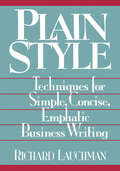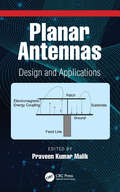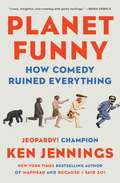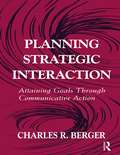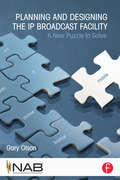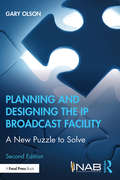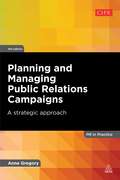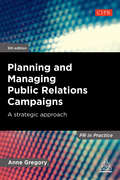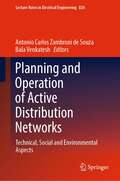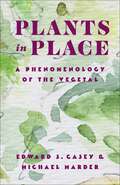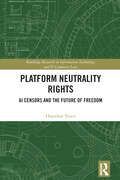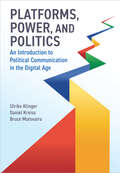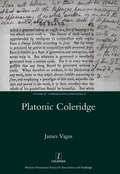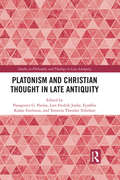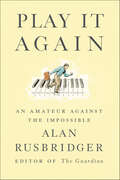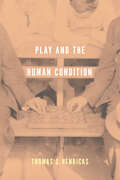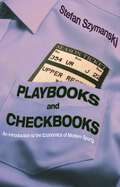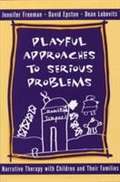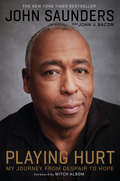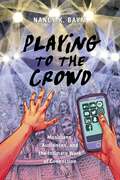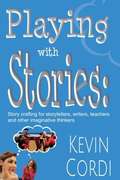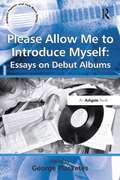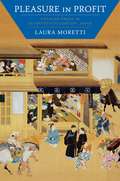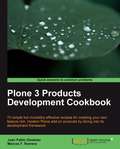- Table View
- List View
Plain Style: Techniques for Simple, Concise, Emphatic Business Writing
by Richard LauchmanGood writing is good business. Simple, straightforward writing saves time, creates good relationships, and prevents expensive misunderstandings. But why is it so hard to achieve? This incisive guide suggests ways to think about writing -- what it should look and sound like, as well as what it should accomplish -- that can simplify how writers choose to express their ideas. It examines the reasons why many businesspeople with good skills tend to write strange, needlessly complicated sentences -- and shows them how to break the habit. Plain Style offers 35 practical techniques that foster simplicity, conciseness, and emphasis.
Planar Antennas: Design and Applications (Electrical Engineering Developments Ser.)
by Praveen Kumar MalikThis comprehensive reference text discusses fundamental concepts, applications, design techniques, and challenges in the field of planar antennas. The text focuses on recent advances in the field of planar antenna design and their applications in various fields of research, including space communication, mobile communication, wireless communication, and wearable applications. This resource presents planar antenna design concepts, methods, and techniques to enhance the performance parameters and applications for IoTs and device-to-device communication. The latest techniques used in antenna design, including their structures defected ground, MIMO, and fractal design, are discussed comprehensively. The text will be useful for senior undergraduate students, graduate students, and academic researchers in fields including electrical engineering, electronics, and communication engineering.
Planet Funny: How Comedy Took Over Our Culture
by Ken JenningsA Kirkus Reviews Best Book of the Year The witty and exuberant New York Times bestselling author and record-setting Jeopardy! champion Ken Jennings relays the history of humor in &“lively, insightful, and crawling with goofy factlings,&” (Maria Semple, author of Where&’d You Go Bernadette)—from fart jokes on clay Sumerian tablets to the latest Twitter gags and Facebook memes.Where once society&’s most coveted trait might have been strength or intelligence or honor, today, in a clear sign of evolution sliding off the trails, it is being funny. Yes, funniness. Consider: Super Bowl commercials don&’t try to sell you anymore; they try to make you laugh. Airline safety tutorials—those terrifying laminated cards about the possibilities of fire, explosion, depressurization, and drowning—have been replaced by joke-filled videos with multimillion-dollar budgets and dance routines. Thanks to social media, we now have a whole Twitterverse of amateur comedians riffing around the world at all hours of the day—and many of them even get popular enough online to go pro and take over TV. In his &“smartly structured, soundly argued, and yes—pretty darn funny&” (Booklist, starred review) Planet Funny, Ken Jennings explores this brave new comedic world and what it means—or doesn&’t—to be funny in it now. Tracing the evolution of humor from the caveman days to the bawdy middle-class antics of Chaucer to Monty Python&’s game-changing silliness to the fast-paced meta-humor of The Simpsons, Jennings explains how we built our humor-saturated modern age, where lots of us get our news from comedy shows and a comic figure can even be elected President of the United States purely on showmanship. &“Fascinating, entertaining and—I&’m being dead serious here—important&” (A.J. Jacobs, author of The Year of Living Biblically), Planet Funny is a full taxonomy of what spawned and defines the modern sense of humor.
Planning Strategic Interaction: Attaining Goals Through Communicative Action (Routledge Communication Ser.)
by Charles R. BergerIn an earlier era, the communication field was dominated by the study of mediated and unmediated message effects during which considerable research focused on the attitudinal and action consequences of exposure to messages. A more catholic purview of the communication process exists today. This more encompassing perspective does not deny the importance of studying message effects, but raises the additional question of how individuals generate messages in the first place. While the earlier era of communication research was dominated by studies that focused on attitude and behavior change as primary dependent variables, such variables as message comprehension have begun to emerge in this new era. The focus on communication and cognition has led, paradoxically, to a more intense focus on social interaction processes. The theory and research presented in this volume seeks to strike a balance between the internal workings of the individual cognitive system on the one hand and the outer world of social interaction on the other. Whether or not the theory and research stands the test of time, it is clear that complete cognitive accounts of social interaction cannot confine themselves to mere descriptions of the cognitive structures and processes that are responsible for message production and comprehension. Explicit links must be made between these cognitive structures and processes and the workings of social interaction. This work takes a modest step in that direction.
Planning and Designing the IP Broadcast Facility: A New Puzzle to Solve
by Gary OlsonThe transition to computer-based technologies and file-based workflows is one of the most significant changes the broadcast and production industry has seen. Media is produced for multiple delivery platforms: Over the Air, Over the Top, large screen displays, cable, satellite, web, digital signage, tablets, and smartphones. These changes impact all aspects of creation, production, media management, technical operations, business processes, and distribution to end users. Of all the books and papers discussing storage mapping, packet transport, and compression algorithms, none puts all the pieces together and explains where these fit into the whole environment. Planning and Designing the IP Broadcast Facility is the first to provide a comprehensive understanding of the technology architecture, physical facility changes, and—most importantly—the new media management workflows and business processes to support the entire lifecycle of the IP broadcast facility from an engineering and workflow perspective. Key features: This beginning-to-end perspective gives you the necessary knowledge to make the decisions to implement a cost-effective file-based production and distribution system. The cohesive, big-picture viewpoint helps you identify the differences in a tape-based facility, then how to overcome the unique challenges of upgrading your plant. Case studies throughout the book serve as recommendations and examples of use, helping you weigh the pros and cons of various approaches.
Planning and Designing the IP Broadcast Facility: A New Puzzle to Solve
by Gary OlsonThis book provides a comprehensive understanding of the technology architecture, physical facility changes and – most importantly – the new media management workflows and business processes to support the entire lifecycle of the IP broadcast facility from an engineering and workflow perspective. Fully updated, this second edition covers the technological evolutions and changes in the media broadcast industry, including the new standards and specifications for live IP production, the SMPTE ST2110 suite of standards, the necessity of protecting against cyber threats and the expansion of cloud services in opening new possibilities. It provides users with the necessary information for planning, organizing, producing and distributing media for the modern broadcast facility. Key features of this text include: Strategies to implement a cost-effective live and file-based production and distribution system. A cohesive, big-picture viewpoint that helps you identify how to overcome the challenges of upgrading your plant. The impact live production is having on the evolution to IP. Case studies serve as recommendations and examples of use. New considerations in engineering and maintenance of IP and file-based systems. Those in the fields of TV, cable, IT engineering and broadcast engineering will find this book an invaluable resource, as will students learning how to set up modern broadcast facilities and the workflows of contemporary broadcasting.
Planning and Managing Public Relations Campaigns
by Anne GregoryGetting a public relations campaign or programme off the ground can seem overwhelming. Planning and Managing Public Relations Campaigns provides a blueprint for all practitioners. Practical and easy to read, the book presents a 12-point plan for ensuring success of campaigns of all sizes, covering many vital areas including the role of public relations in organizations, the importance of context, research and analysis, setting objectives, strategy and tactics, timescales and resources, evaluation and review. Planning and Managing Public Relations Campaigns is widely regarded as one of the best 'how-to' guides for students and practitioners. This fully updated fourth edition features new developments in public relations, including social media, along with new case studies including WRAP's Love Food, Hate Waste campaign; The Sleep Pod Hotel Media Tour; McArthur River Mining; AkzoNobel's Corporate Revolution; the UK Department of Culture, Media & Sport's First World War Centenary Commemorations; and Lanson's campaign for unbiased.co.uk. About the PR in Practice series: Published in collaboration with the Chartered Institute of Public Relations (CIPR), the PR in Practice series consists of accessible, practical introductions to day-to-day public relations practice and management issues. The series' action-oriented approach keeps practitioners' knowledge and skills up to date.
Planning and Managing Public Relations Campaigns: A Strategic Approach (Pr In Practice Ser.)
by Anne GregoryTaking a public relations campaign from planning through to implementation can seem overwhelming. Planning and Managing Public Relations Campaigns provides a blueprint for success, and is widely regarded as one of the best 'how-to' guides for students and practitioners. Digestible and easy to read, this fifth edition presents a 12-point plan for ensuring success of campaigns of all sizes, covering vital areas including the role of public relations in organizations, the importance of context, research and analysis, setting objectives, strategy and tactics, timescales and resources, evaluation and review.With discussion of new developments in the industry, from the gig economy and online influencers, to disruptive models, this fully updated new edition addresses the need for agile planning and draws on fresh case studies to provide up-to-date examples of best practice. Supported by a suite of online resources, Planning and Managing Public Relations Campaigns is an invaluable guide for students and practitioners alike. Online resources include extended case studies, lecture slides, discussion questions and assessment tasks.
Planning and Operation of Active Distribution Networks: Technical, Social and Environmental Aspects (Lecture Notes in Electrical Engineering #826)
by Antonio Carlos Zambroni de Souza Bala VenkateshThis book offers a broad and detailed view about how traditional distribution systems are evolving smart/active systems. The reader will be able to share the view of a number of researchers directly involved in this field. For this sake, philosophical discussions are enriched by the presentation of theoretical and computational tools. A senior reader may incorporate some concepts not available during his/her graduation process, whereas new Engineers may have contact with some material that may be essential to his/her practice as professionals.
Plants in Place: A Phenomenology of the Vegetal (Critical Life Studies)
by Edward S. Casey Michael MarderPlants are commonly considered immobile, in contrast to humans and other animals. But vegetal existence involves many place-based forms of change: stems growing upward, roots spreading outward, fronds unfurling in response to sunlight, seeds traveling across wide distances, and other intricate relationships with the surrounding world. How do plants as sessile, growing, decaying, and metamorphosing beings shape the places they inhabit, and how are they shaped by them? How do human places interact with those of plants—in lived experience; in landscape painting; in cultivation and contemplation; in forests, fields, gardens, and cities?Examining these questions and many more, Plants in Place is a collaborative study of vegetal phenomenology at the intersection of Edward S. Casey’s phenomenology of place and Michael Marder’s plant-thinking. It focuses on both the microlevel of the dynamic constitution of plant edges or a child’s engagement with moss and the macrolevel of habitats that include the sociality of trees. This compelling portrait of plants and their places provides readers with new ways to appreciate the complexity and vitality of vegetal life. Eloquent, descriptively rich, and insightful, the book also shows how the worlds of plants can enhance our understanding and experience of place more broadly.
Platform Neutrality Rights: AI Censors and the Future of Freedom (Routledge Research in Information Technology and E-Commerce Law)
by Hannibal TravisThis book analyzes questions of platform bias, algorithmic filtering and ranking of Internet speech, and declining perceptions of online freedom.Courts have intervened against unfair platforms in important cases, but they have deferred to private sector decisions in many others, particularly in the United States. The First Amendment, human rights law, competition law, Section 230 of the Communications Decency Act, and an array of state and foreign laws address bad faith conduct by Internet platforms or other commercial actors. Arguing that the problem of platform neutrality is similar to the net neutrality problem, the book discusses the assault on freedom of speech that emerges from public-private partnerships. The book draws parallels between U.S. constitutional and statutory doctrines relating to shared spaces and the teachings of international human rights bodies relating to the responsibilities of private actors. It also connects the dots between new rights to appeal account or post removals under the Digital Services Act of the European Union and a variety of fair treatment obligations of platforms under American and European competition laws, “public accommodations” laws, and public utilities laws. Analyzing artificial intelligence (AI) regulation from the point of view of social-media and video-platform users, the book explores overlaps between European and U.S. efforts to limit algorithmic censorship or “shadow-banning”.The book will be of interest to students and scholars in the field of cyberlaw, the law of emerging technologies and AI law.
Platforms, Power, and Politics: An Introduction to Political Communication in the Digital Age
by Bruce Mutsvairo Daniel Kreiss Ulrike KlingerPolitical communication has fundamentally transformed as digital technologies have become increasingly important in everyday life. Technology platforms have become powerful political instruments for world leaders, campaigns, social movements, journalists, and non-governmental organizations. Moreover, they are essential to how people communicate about politics, encounter and share political information, and take action to pursue their political goals. This is the first textbook to center digital platforms in understanding political communication. With global examples beyond the context of Western democracies, the text reveals how digital technologies such as social media and search engines are increasingly shaping political communication in countries around the world. It shows how the core processes of political communication are being reshaped by platforms, from how elections are contested to how issues make it onto policymaking agendas. Topics covered include public opinion, journalism, strategic communication, political parties, social movements, governance, disinformation, propaganda, populism, race, ethnicity, and democratic backsliding. Full of lively examples and pedagogical features, Platforms, Power, and Politics offers an exciting and innovative new approach to political communication. It is essential reading for students of political communication and an important resource for scholars, journalists, and policymakers.
Platonic Coleridge
by James Vigus"The ambivalent curiosity of the young poet Samuel Taylor Coleridge (1772-1834) towards Plato - 'but I love Plato - his dear gorgeous nonsense!' - soon developed into a philosophical project, and the mature Coleridge proclaimed himself a reviver of Plato's unwritten or esoteric 'systems'. James Vigus's study traces Coleridge's discovery of a Plato marginalised in the universities, and examines his use of German sources on the 'divine philosopher', and his Platonic interpretation of Kant's epistemology. It compares Coleridge's figurations of poetic inspiration with models in the Platonic dialogues, and investigates whether Coleridge's esoteric 'system' of philosophy ultimately fulfilled the Republic's notorious banishment of poetry."
Platonism and Christian Thought in Late Antiquity (Studies in Philosophy and Theology in Late Antiquity)
by Panagiotis G. Pavlos Lars Fredrik Janby Eyjólfur Kjalar Emilsson Torstein Theodor TollefsenPlatonism and Christian Thought in Late Antiquity examines the various ways in which Christian intellectuals engaged with Platonism both as a pagan competitor and as a source of philosophical material useful to the Christian faith. The chapters are united in their goal to explore transformations that took place in the reception and interaction process between Platonism and Christianity in this period. The contributions in this volume explore the reception of Platonic material in Christian thought, showing that the transmission of cultural content is always mediated, and ought to be studied as a transformative process by way of selection and interpretation. Some chapters also deal with various aspects of the wider discussion on how Platonic, and Hellenic, philosophy and early Christian thought related to each other, examining the differences and common ground between these traditions. Platonism and Christian Thought in Late Antiquity offers an insightful and broad ranging study on the subject, which will be of interest to students of both philosophy and theology in the Late Antique period, as well as anyone working on the reception and history of Platonic thought, and the development of Christian thought.
Platypus and Fly: Targeting l Blends (Speech Bubbles 2)
by Melissa PalmerFly is sneaky and very cheeky. He likes to tease and annoy other creatures around him. Then he meets Platypus, who is ready for lunch. The race is on, but who will win? This picture book targets /l/ blends and is part of Speech Bubbles 2, a series of picture books that target specific speech sounds within the story. The series can be used for children receiving speech therapy, for children who have a speech sound delay/disorder, or simply as an activity for children’s speech sound development and/or phonological awareness. They are ideal for use by parents, teachers or caregivers. Bright pictures and a fun story create an engaging activity perfect for sound awareness. Picture books are sold individually, or in a pack. There are currently two packs available – Speech Bubbles 1 and Speech Bubbles 2. Please see further titles in the series for stories targeting other speech sounds.
Play It Again: An Amateur Against the Impossible
by Alan RusbridgerThe Guardian editor and amateur pianist’s account of a remarkable musical challenge during an extraordinary year for news.As editor of the Guardian, one of the world’s foremost newspapers, Alan Rusbridger lives by the relentless twenty-four-hour news cycle. But increasingly in midlife, he feels the gravitational pull of music—especially the piano. He sets himself a formidable challenge: within a year, to fluently learn Chopin’s magnificent Ballade No. 1 in G minor, arguably one of the most difficult Romantic compositions in the repertory. With pyrotechnic passages that require feats of memory, dexterity, and power, the piece is one that causes alarm even in battle-hardened concert pianists.Under ideal circumstances, this would have been a daunting task. But the particular year Rusbridger chooses turns out to be one of frenetic intensity, beginning with WikiLeaks’ massive dump of state secrets and ending with the Guardian’s revelations about widespread phone hacking at News of the World. “In between, there were the Japanese tsunami, the Arab Spring, the English riots . . . and the death of Osama Bin Laden,” writes Rusbridger. The test would be to “nibble out” twenty minutes per day to do something totally unrelated to these events.Rusbridger’s subject is larger than any one piece of music: Play It Again deals with focus, discipline, and desire but is, above all, about the sanctity of one’s inner life in a world dominated by deadlines and distractions.Praise for Play It Again“An absorbing, adroitly crafted tale of humility, discipline and the sheer love of music . . . [Alan Rusbridger’s] triumph is an inspiration.” —Katie Hafner, The New York Times Book Review“A unique mélange of political and musical reportage . . . [Alan Rusbridger] illuminates not only print media in this digital age but also the changing role of the music within.” —Iain Burnside, The Observer (London)
Play Reconsidered: Sociological Perspectives on Human Expression
by Thomas S. HenricksUnderstanding the significance of adult play in the life of modern societies Within the social sciences, few matters are as significant as the study of human play--or as neglected. In Play Reconsidered, rather than viewing play simply as a preoccupation of the young and a vehicle for skill development, Thomas S. Henricks argues that it’s a social and cultural phenomenon of adult life, enveloped by wider structures and processes of society. In that context, he argues that a truly sociological approach to play should begin with a consideration of the largely overlooked writings on play and play-related topics by some of the classic sociological thinkers of the twentieth century. Henricks explores Karl Marx’s analysis of creativity in human labor, examines Emile Durkheim’s observations on the role of ritual and the formation of collective consciousness, extends Max Weber’s ideas about the process of rationalization to the realm of expressive culture and play, surveys Georg Simmel’s distinctive approach to sociology and sociability, and discusses Erving Goffman’s focus on human conduct as process and play as “encounter.” These and other discussions of the contributions of more recent sociologists are framed by an initial consideration of Johan Huizinga’s famous challenge to understand the nature and significance of play. In a closing synthesis, Henricks distinguishes play from other forms of human social expression, particularly ritual, communitas, and work.
Playbooks and Checkbooks: An Introduction to the Economics of Modern Sports
by Stefan SzymanskiWhat economic rules govern sports? How does the sports business differ from other businesses? Playbooks and Checkbooks takes a fascinating step-by-step look at the fundamental economic relationships shaping modern sports. Focusing on the ways that the sports business does and does not overlap with economics, the book uncovers the core paradox at the heart of the sports industry. Unlike other businesses, the sports industry would not survive if competitors obliterated each other to extinction, financially or otherwise--without rivals there is nothing to sell. Playbooks and Checkbooks examines how this unique economic truth plays out in the sports world, both on and off the field. Noted economist Stefan Szymanski explains how modern sporting contests have evolved; how sports competitions are organized; and how economics has guided antitrust, monopoly, and cartel issues in the sporting world. Szymanski considers the motivation provided by prize money, uncovers discrepancies in players' salaries, and shows why the incentive structure for professional athletes encourages them to cheat through performance-enhancing drugs and match fixing. He also explores how changes in media broadcasting allow owners and athletes to play to a global audience, and why governments continue to publicly fund sporting events such as the Olympics, despite almost certain financial loss. Using economic tools to reveal the complex arrangements of an industry, Playbooks and Checkbooks illuminates the world of sports through economics, and the world of economics through sports.
Playful Approaches to Serious Problems: Narrative Therapy with Children and their Families
by David Epston Jennifer Freeman Dean LobovitsThe "grown-up talk" of therapy is likely to turn off children - especially if it focuses on their problematic behavior. The highly effective techniques of narrative therapy include children by respecting their unique language, stories, and views of the world. This book describes a basic theory of collaborative narrative play, as well as verbal and nonverbal techniques that clear the way for stories of hope, possibility, and change. Compelling case examples, drawn from the authors' work, will appeal to parents and educators as well as therapists.
Playing Hurt: My Journey from Despair to Hope
by Mitch Albom John U. Bacon John SaundersFor the first time ever, the popular late host of ESPN's The Sports Reporters and ABC's college football openly discusses a lifelong battle with depression.During his three decades on ESPN and ABC, John Saunders became one of the nation's most respected and beloved sportscasters. In this moving, jarring, and ultimately inspiring memoir, Saunders discusses his troubled childhood, the traumatic brain injury he suffered in 2011, and the severe depression that nearly cost him his life. As Saunders writes, Playing Hurt is not an autobiography of a sports celebrity but a memoir of a man facing his own mental illness, and emerging better off for the effort. I will take you into the heart of my struggle with depression, including insights into some of its causes, its consequences, and its treatments.I invite you behind the facade of my apparently "perfect" life as a sportscaster, with a wonderful wife and two healthy, happy adult daughters. I have a lot to be thankful for, and I am truly grateful. But none of these things can protect me or anyone else from the disease of depression and its potentially lethal effects.Mine is a rare story: that of a black man in the sports industry openly grappling with depression. I will share the good, the bad, and the ugly, including the lengths I've gone to to conceal my private life from the public.So why write a book? Because I want to end the pain and heartache that comes from leading a double life. I also want to reach out to the millions of people, especially men, who think they're alone and can't ask for help. John Saunders died suddenly on August 10 ,2016, from an enlarged heart, diabetes, and other complications. This book is his ultimate act of generosity to help those who suffer from mental illness, and those who love them.
Playing to the Crowd: Musicians, Audiences, and the Intimate Work of Connection (Postmillennial Pop #14)
by Nancy K. BaymExplains what happened to music—for both artists and fans—when music went online. Playing to the Crowd explores and explains how the rise of digital communication platforms has transformed artist-fan relationships into something closer to friendship or family. Through in-depth interviews with musicians such as Billy Bragg and Richie Hawtin, as well as members of the Cure, UB40, and Throwing Muses, Baym reveals how new media has facilitated these connections through the active, and often required, participation of the artists and their devoted, digital fan base.Before the rise of social sharing and user-generated content, fans were mostly seen as an undifferentiated and unidentifiable mass, often mediated through record labels and the press. However, in today’s networked era, musicians and fans have built more active relationships through social media, fan sites, and artist sites, giving fans a new sense of intimacy and offering artists unparalleled information about their audiences. However, this comes at a price. For audiences, meeting their heroes can kill the mystique. And for artists, maintaining active relationships with so many people can be both personally and financially draining, as well as extremely labor intensive.Drawing on her own rich history as an active and deeply connected music fan, Baym offers an entirely new approach to media culture, arguing that the work musicians put in to create and maintain these intimate relationships reflect the demands of the gig economy, one which requires resources and strategies that we must all come to recognize and appreciate.
Playing with Stories: Story-crafting for storytellers, writers, teachers and other imaginative thinkers
by Kevin D. CordiAn educator's manual for teachers, leaders and students of oral storytelling arts developed by a Ph.D. professor who has worked extensively with all ages.
Please Allow Me to Introduce Myself: Essays On Debut Albums (Ashgate Popular and Folk Music Series)
by George PlasketesDebut albums are among the cultural artefacts that capture the popular imagination especially well. As a first impression, the debut album may take on a mythical status, whether the artist or group achieves enduring success or in rare cases when an initial record turns out to be an apogee for an artist. Whatever the subsequent career trajectory, the debut album is a meaningful text that can be scrutinized for its revelatory signs and the expectations that follow. Please Allow Me to Introduce Myself: Essays on Debut Albums tells the stories of 23 debut albums over a nearly fifty year span, ranging from Buddy Holly and the Crickets in 1957 to The Go! Team in 2004. In addition to biographical background and a wealth of historical information about the genesis of the album, each essay looks back at the album and places it within multiple contexts, particularly the artist’s career development. In this way, the book will be of as much interest to sociologists and historians as to culture critics and musicologists.
Pleasure in Profit: Popular Prose in Seventeenth-Century Japan
by Laura MorettiIn the seventeenth century, Japanese popular prose flourished as waves of newly literate readers gained access to the printed word. Commercial publishers released vast numbers of titles in response to readers’ hunger for books that promised them potent knowledge. However, traditional literary histories of this period position the writings of Ihara Saikaku at center stage, largely neglecting the breadth of popular prose.In the first comprehensive study of the birth of Japanese commercial publishing, Laura Moretti investigates the vibrant world of vernacular popular literature. She marshals new data on the magnitude of the seventeenth-century publishing business and highlights the diversity and porosity of its publishing genres. Moretti explores how booksellers sparked interest among readers across the spectrum of literacies and demonstrates how they tantalized consumers with vital ethical, religious, societal, and interpersonal knowledge. She recasts books as tools for knowledge making, arguing that popular prose engaged its audience cognitively as well as aesthetically and emotionally to satisfy a burgeoning curiosity about the world. Crucially, Moretti shows, readers experienced entertainment within the didactic, finding pleasure in the profit gained from acquiring knowledge by interacting with transformative literature. Drawing on a rich variety of archival materials to present a vivid portrait of seventeenth-century Japanese publishing, Pleasure in Profit also speaks to broader conversations about the category of the literary by offering a new view of popular prose that celebrates plurality.
Plone 3 Products Development Cookbook
by Juan Pablo GimenezThe examples in this book follow a sample project creating a digital newspaper website to meet the requirements of a fictional customer who wants to place commercial advertisements all over the site. The whole book is a comprehensive collection of recipes that elaborate a series of well known use cases. You will find an organized step-by-step procedure to accomplish each task followed by detailed explanations to better understand how and why each topic was undertaken, and many links to online references and other related sections in the book that can supplement the subject in question. You can read the whole book or just pick the recipes that are relevant for you; where necessary, cross references will help you understand the recipes even if you do not read them in sequential order. This book is for programmers who have some knowledge of Python, Plone, and Zope. If you want to develop feature-rich add-on products in Plone, this book is for you. It is aimed at the development of backend features, so you need not have other web-related skills such as HTML, CSS, or JavaScript.
